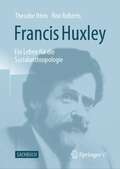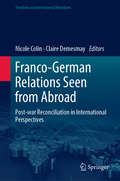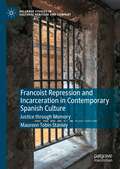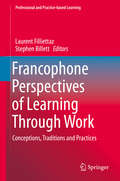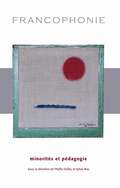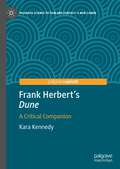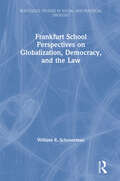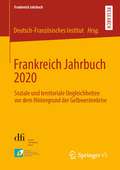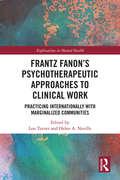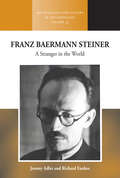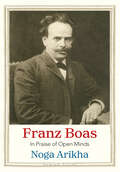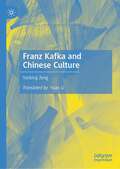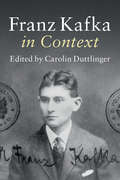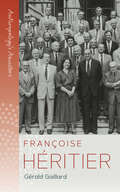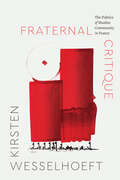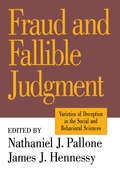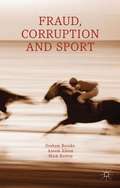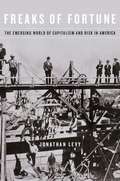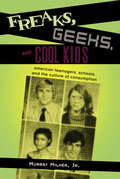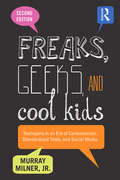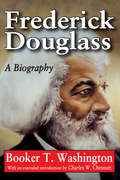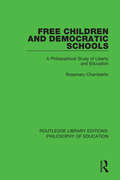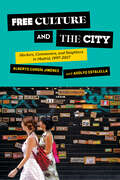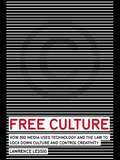- Table View
- List View
Francis Huxley: Ein Leben für die Sozialanthropologie
by Ron Roberts Theodor IttenDieses Buch über das Leben und Werk von Francis Huxley (1923–2016) zeichnet zugleich die Suche nach dem Verständnis der Conditio humana nach und nimmt seine Leserinnen und Leser mit auf eine biografische, philosophische, kulturelle, historische, politische und epistemologische Erkundungsreise.Als Mitglied der berühmten Huxley-Dynastie leistete Francis Huxley wichtige und innovative Beiträge zur Sozialanthropologie, zur Pflege der psychischen Gesundheit und zum Schutz indigener Völker. Seine ungewöhnliche Laufbahn und Lebensgeschichte zeigen, wie die Produktion und Verbreitung von Ideen in einem intergenerationellen und soziologischen Kontext verstanden werden kann. Das Buch reflektiert die zeitgenössische Relevanz von Huxleys Werk und stellt Verbindungen her zwischen den zentralen philosophischen, kulturellen, wissenschaftlichen und politischen Themen des turbulenten frühen 21. Jahrhunderts und den überdauernden Fragen, die die Menschen auf der Suche nach dem Verständnis ihrer selbst und ihres Platzes in der Welt antreiben. Dieses Buch ist für alle Studierenden, Forschenden und Lehrenden der Sozial- und Geisteswissenschaften von Interesse.Dieses Buch ist eine gründliche und faszinierende Darstellung des Lebens meines Onkels Francis, mit all seinen Schatten und Sonnenseiten. Die Autoren beschreiben seinen sprunghaften Charakter gut. Sie geben eine genaue Einschätzung seines Lebenswerkes und seiner Schriften Victoria Huxley, Nichte. Diese Studie über Francis Huxley ist willkommen und überfällig, denn er war einer der größten Sozialanthropologen der indigenen Völker Amazoniens. Seine Beobachtungen waren gründlich, wissenschaftlich korrekt und entsprachen den höchsten Standards seiner Disziplin. Huxley war in zweierlei Hinsicht außergewöhnlich. Sein reizvoller Schreibstil vermittelte seine Leidenschaft sowohl den allgemeinen LeserInnen als auch den WissenschaftlerInnen. Er war mir ein herzlicher Freund, den Menschen der indigenen Völker, die er studierte, wie ein dazugehöriger. Francis war fasziniert von deren Mythologien und ihren geistigen sowie spirituellen Welten. Er konnte sich gut in sie einfühlen und dachte fast wie einer von ihnen. John Hemming, Autor von Menschen des Regenwaldes Dies ist ein ungemein fesselndes und packendes Buch. Nachdenklich und gut geschrieben, vermittelt es gekonnt und mit großem Einfühlungsvermögen die vielen faszinierenden Schichten von Francis Huxley, sein reiches und vielfältiges Leben, sowie seine Vorlieben und seine Philosophie. Fiona Watson, Survival International
Franco-German Relations Seen from Abroad: Post-war Reconciliation in International Perspectives (Frontiers in International Relations)
by Nicole Colin Claire DemesmayThis book examines external perceptions of the Franco-German relationship, both from a historical perspective and as a driving force for regional integration. By providing various country and regional studies, it analyses the various types of perception and self-perception in several regions around the globe. Here, Franco-German cooperation serves as a mirror in which third-party countries view their own situation, today and in the future. The contributions address the questions of if and how the Franco-German reconciliation and cooperation is perceived as a role model for other regions, especially for the reconciliation of other inter-state and international conflicts. A concluding chapter highlights the divergences and convergences between the respective conflicts, and proposes recommendations for actors involved in diplomacy and international relations.The book is intended to provide scientific support for the implementation of the Franco-German Aachen Treaty of January 2019. It will appeal to scholars in political science and cultural studies, and to anyone interested in learning more about the Franco-German relationship and on external perspectives on it.
Francoist Repression and Incarceration in Contemporary Spanish Culture: Justice through Memory (Palgrave Studies in Cultural Heritage and Conflict)
by Maureen Tobin StanleyThis book examines the cultural articulation of Spanish History (and histories (remembered, meaningful experiences). It analyzes how real people and fictional characters experience the rupture of post-war repression, as their vindicating collective memory counters the authoritarian narrative and laws that demonized and criminalized them. The book, that breaks the persistent cycle of denial of Francoist malfeasance, is a resource for scholars and students who research the representation of Spain’s dictatorship, its aftermath and the recovery of postdictatorial memory.
Francophone Perspectives of Learning Through Work
by Stephen Billett Laurent FilliettazThis book generates a comprehensive account of ways in which practice-based learning has been conceptualized in the Francophone context. Learning for occupations, and the educational and practice-based experiences supporting it are the subject of increased interest and attention globally. Governments, professional bodies, workplaces and workers are now looking for experiences that support the initial and ongoing development of occupational capacities. Consequently, more attention is being given to workplaces as sites for this learning. This focus on learning through work has long been emphasised in the Francophone world, which has developed distinct traditions and conceptions of associations between work and learning. These include ergonomics and professional didactics. Yet, whilst being accepted and of long standing in the Francophone world, these conceptions and traditions, and the practices supporting them are little known about or understood in the Anglophone world, which is the dominant medium for scientific and educational discussion. This book addresses this problem through drawing on accounts from France, Switzerland and Canada that make accessible and elaborate these traditions, conceptions and practices through examples of their applications to occupationally related learning. These accounts offer variations and culturally-specific developments of these traditions, but collectively emphasize a preoccupation with how both work and learning need to be understood through situated considerations of persons enacting their work practice. In this way, they offer noteworthy and worthwhile contributions to contemporary global considerations of learning through work.
Francophonie, minorités et pédagogie (Collection Questions en éducation)
by Phyllis Dalley Sylvie RoyFrancophonie, minorités et pédagogie regroupe des textes de sociologues et sociolinguistes activement impliqués dans la recherche sur l’éducation de minorités linguistiques au sein de la Francophonie. La richesse en diversité de ces textes permet de souligner l’apport de la sociolinguistique en matière d’analyse des politiques éducatives. De même, ce collectif met en lumière la contribution de la sociolinguistique en matière de production de connaissances mais aussi de développement d’une pédagogie visant une inclusion et le respect du groupe minoritaire au-delà de toutes frontières. Publié en français
Frank Herbert's "Dune": A Critical Companion (Palgrave Science Fiction and Fantasy: A New Canon)
by Kara KennedyThis book offers a critical study of Frank Herbert’s Dune (1965), the world’s bestselling science fiction novel. Kara Kennedy discusses the novel’s exploration of politics and religion, its influential ecological messages, the focus on the human mind and consciousness, the complex nature of the archetypal hero, and the depiction of women’s influence and control. In Dune, Herbert demonstrated that sophistication, complexity, and a multi-layered world with three-dimensional characters could sit comfortably within the science fiction genre. Underneath its deceptively simple storyline sits a wealth of historical and philosophical contexts and influences that make it a rich masterpiece open to multiple interpretations. Kennedy’s study shows the continuing relevance of the novel in the 21st century due to its classic themes and its concerns about the future of humanity, as well as the ongoing nature of issues such as ecological disruption and conflicts over resources and religion.
Frankfurt School Perspectives on Globalization, Democracy, and the Law (Routledge Studies in Social and Political Thought #Vol. 55)
by William E. ScheuermanFrankfurt School Perspectives on Globalization, Democracy, and the Law makes use of the work of first-generation Frankfurt School theorist Franz L. Neumann, in conjunction with his famous successor, Jürgen Habermas, to try to understand the momentous political and legal transformations generated by globalization. This volume demonstrates that the Frankfurt School tradition speaks directly to some pressing political and social concerns, including globalization, the reform of the welfare state, and the environmental crisis. Despite widespread claims to the contrary, the legal substructure of economic globalization tends to conflict with traditional models of the "rule of law." Neumann’s prediction that contemporary capitalism would decreasingly depend on generality, clarity, publicity, and stability in the law is supported by a surprising variety of empirical evidence. Habermas’s recent work is then interrogated in order to pursue the question of how we might counteract the deleterious trends accurately predicted by Neumann. How might democracy and the rule of law flourish in the context of globalization? The book is intended for scholars and advanced students in political science, sociology, philosophy and cultural studies.
Frankreich Jahrbuch 2020: Soziale und territoriale Ungleichheiten vor dem Hintergrund der Gelbwestenkrise (Frankreich Jahrbuch)
by Deutsch-Französisches InstitutDas vorliegende Frankreich Jahrbuch gibt einen Überblick über soziale und territoriale Unterschiede in Deutschland und Frankreich. Diese betreffen die Lebensrealität einzelner Bevölkerungsgruppen ebenso wie den Zugang zu Dienstleistungen des täglichen Lebens und der öffentlichen Daseinsvorsorge. Ausgangspunkt ist Frankeich, wo das Thema verbunden mit der Gelbwestenbewegung ins Zentrum politischer Aufmerksamkeit gerückt ist. Neben einer empirischen Bestandsaufnahme bestehender Ungleichheiten und ihrer Folgen werden anhand konkreter Fallbeispiele Herausforderungen und Lösungsansätze diskutiert.
Frantz Fanon’s Psychotherapeutic Approaches to Clinical Work: Practicing Internationally with Marginalized Communities (Explorations in Mental Health)
by Helen A. Neville Lou TurnerRecognizing Frantz Fanon’s remarkable legacy to applied mental health and therapeutic practices which decolonize, humanize, and empower marginalized populations, this text serves as a timely call for research, education, and clinical work to establish and further develop Fanonian approaches and practices. As the first collection to focus on contemporary clinical applications of Fanon’s research and practice, this volume adopts a transnational lens through which to capture the global reach of Fanon’s work. Contributors from Africa, Australia, Europe, and North America offer nuanced insight into historical and theoretical methods, clinical case studies, and community-based innovations to place Fanon’s research and practice in context. Organized into four key areas, including the Historical Significance of Fanon’s Clinical Work; Theory and Fanonian Praxis; Psychotherapeutic and Community Applications; and Action Research, each section of the book reflects an impressive diversity of practices around the world, and considers the role of political and socioeconomic context, structures of gender oppression, racial identities, and their intersection within those practices. A unique manifesto to the ground-breaking and immensely relevant work of Frantz Fanon, this book will be of great interest to graduate and post graduate students, researchers, academics and professionals in counselling psychology, mental health research, and psychotherapy.
Franz Baermann Steiner: A Stranger in the World (Methodology & History in Anthropology #42)
by Jeremy Adler Richard FardonFranz Baermann Steiner (1909-52) provided the vital link between the intellectual culture of central Europe and the Oxford Institute of Anthropology in its post-Second World War years. This book demonstrates his quiet influence within anthropology, which has extended from Mary Douglas to David Graeber, and how his remarkable poetry reflected profoundly on the slavery and murder of the Shoah, an event which he escaped from. Steiner’s concerns including inter-disciplinarity, genre, refugees and exile, colonialism and violence, and the sources of European anthropology speak to contemporary concerns more directly now than at any time since his early death.
Franz Boas: In Praise of Open Minds (Jewish Lives)
by Noga ArikhaA thought-provoking account of the life and work of Franz Boas and his influential role in shaping modern anthropology Franz Boas (1858–1942) is widely acknowledged for his pioneering work in the field of cultural anthropology. His rigorous studies of variations across societies were aimed at demonstrating that cultures and peoples were not shaped by biological predispositions. This book traces Boas&’s life and intellectual passions from his roots in Germany and his move to the United States in 1884, partly in response to growing antisemitism in Germany, to his work with First Nations communities and his influential role as a teacher, mentor, and engaged activist who inspired an entire generation. Drawing from Boas&’s numerous but rarely read writings, Noga Arikha brings to life the man and the ideas he developed about the complex interplay of mind and culture, biology and history, language and myth. She provides a comprehensive picture of the cultural contexts in which he worked, of his personal and professional relationships, and of his revolutionary approach to fieldwork. He was celebrated in his lifetime for the cultural relativism he developed and the arguments he marshaled against entrenched racialism. But his was a constant battle, and Arikha shows how urgently relevant his voice and legacy have become again today.
Franz Kafka and Chinese Culture
by Yanbing ZengThis book conducts a comprehensive and in-depth analysis of Franz Kafka’s relation to China. Commencing with an examination of the myriad Chinese cultural influences to which Kafka was exposed, it goes on to explore the ways in which they manifest themselves in canonical stories, such as Description of A Struggle, The Great Wall of China, and An Old Manuscript. This leads the way to thought-provoking comparative studies of Kafka and major Chinese writers and philosophers, such as Zhuang Tzu, Pu Songling, Qian Zhongshu, and Lu Xun. Highlighting kindred philosophical concepts, shared aesthetic tastes, and parallel narrative strategies, these comparisons transcend mere textual analysis, to explore the profound cultural, historical, and philosophical implications of Kafka’s works. Finally, the book turns to an examination Kafka’s impact on modern life in China, including its translation studies, literature, and even its mass culture.
Franz Kafka in Context
by Carolin DuttlingerFranz Kafka (1883-1924) lived through one of the most turbulent periods in modern history, witnessing a world war, the dissolution of an empire and the foundation of a new nation state. But the early twentieth century was also a time of social progress and aesthetic experimentation. Kafka's novels and short stories reflect their author's keen but critical engagement with the big questions of his time, and yet often Kafka is still cast as a solitary figure with little or no connection to his age. Franz Kafka in Context aims to redress this perception. In thirty-five short, accessible essays, leading international scholars explore Kafka's personal and working life, his reception of art and culture, his engagement with political and social issues, and his ongoing reception and influence. Together they offer a nuanced and historically grounded image of a writer whose work continues to fascinate readers from all backgrounds.
Françoise Héritier (Anthropology's Ancestors #3)
by Gérald GaillardFollows the life of French anthropologist Françoise Héritier, who had a lasting impact on a generation of French anthropologists that continues to this day. A great intellectual figure, Françoise Héritier succeeded Claude Lévi-Strauss as the Chair of Anthropology at the Collège de France in 1982. She was an Africanist, author of magnificent works on the Samo population, the scientific progenitor of kinship studies, the creator of a theoretical base to feminist thought and an activist for many causes. “I read this intellectual biography of Françoise Héritier with great pleasure. Though highly regarded in France, she is not yet well known in English-language academic circles, but she certainly should be. This book will be a revelation to many anthropologists and feminist scholars.”—Adam Kuper, London School of Economics From the Forword by Michelle Perrot: I came to know her at the National Council for HIV, that she chaired from 1989 to 1994…. Her theoretical concerns were also crucial to the understanding of pandemics, but we did not then realise that HIV/AIDS was also a precursor and a warning of pandemics to come. She grasped the importance of conceptions of bodily ‘humours’—blood, semen, milk—that seemed to play a role in the horrific spread of an epidemic of which we knew nothing, except that it resulted in an appalling mortality rate, particularly among young men…. she was a remarkable chair, concerned to share her insights into the illness and to anchor—necessary—interventions within a framework that would be respectful of human rights.
Fraternal Critique: The Politics of Muslim Community in France (Class 200: New Studies in Religion)
by Kirsten WesselhoeftAn exploration of ways that discord binds rather than divides communal life, through an ethnography of French Muslim activism. The conversation about Islam in France is framed by the presumption that Muslim communities are a threat to secular solidarity or fraternité. In the face of state repression, French Muslims have not closed ranks around a narrow range of voices; instead, Kirsten Wesselhoeft finds that young Muslim activists have continued to purposefully spark debate about the values that anchor community life. Wesselhoeft argues that such disagreements, far from dividing communities, actually constitute a form of belonging. Some activists call this ethic “fraternal critique,” and Wesselhoeft finds in it profound insights about the place for critique in civic life. The French state has reacted to Muslim solidarity with repression, but Wesselhoeft argues that unity need not come at the expense of dissent. Instead, fraternal critique can teach us how to build communities that are worth fighting over and fighting for.
Fraud and Fallible Judgement: Deception in the Social and Behavioural Sciences
by David MarslandFraud and Fallible Judgment is both an exploration of fraud and an examination of the nature of truth in social relations and experience. The essaysin this volume are concerned with deception in the social and behavioral sciences, and conditions that elicit deceptive behavior among scientists, whatever then-discipline. The issue of fraud in the social sciences moves far beyond a simple dictionary definition of duplicity. Errors in experimentation are less definite and less concrete than they are in the physical sciences. Fraud in the social sciences ranges from simple plagiarism of data and ideas to quiet suppression of information.The essays in 'Fraud and Fallible Judgment' raise issues of professional judgment from self-policing to academic policy. Episodes of misconduct in research, once resolved within the academic or scientific community, are now commanding media attention on an unprecedented scale. One net effect over the long term may prove to be that public confidence in the research enterprise has been irretrievably weakened (likewise, perhaps, public willingness to invest tax dollars in the support of that enterprise). Allegations of fraud can also be used to destroy careers. Once maligned, a reputation may never be repaired. The very act of writing on the subject with candor and intelligence is itself an act of rare courage. Contributions to this volume include: David Goodstein, "The Fading Myth of the Noble Scientist"; J. Phillipe Rushton, "Cyril Hurt as the Victim of Scientific Hoax"; Del Thiessen and Robert Young, "Investigating Sexual Coercion"; and Marcel LaFollette, "The Silence of the Social Sciences." This volume is an ideal text for students and scientists in all areas of the social and behavioral sciences, particularly psychologists and sociologists.
Fraud, Corruption and Sport
by Mark Button Graham Brooks Azeem AleemThis book offers historical and contemporary international analysis of fraud and corruption in sport, including a diverse range of cases from the sporting world including football, cricket, horse racing and boxing.
Frauen, die Sex verkaufen: Ein Überblick über die psychologische Forschung mit klinischen Implikationen
by Elizabeth Krumrei Mancuso Bennett E. PostlethwaiteAuf der Grundlage führender empirischer psychologischer Forschungsarbeiten aus der ganzen Welt bietet dieses Buch wertvolle Erkenntnisse über Frauen, die Sex verkaufen. Es fasst die umfangreiche wissenschaftliche Arbeit zum Thema Frauen, die Sex verkaufen, aus einer psychologischen Perspektive zusammen, um zu verstehen, warum Frauen sich dafür entscheiden. Im Gegenzug hebt das Buch eine Reihe wichtiger soziokultureller Kontexte rund um den Verkauf von Sex hervor, die große Stressquellen darstellen, und untersucht, wie Frauen mit diesen Umständen umgehen. Das Buch veranschaulicht den facettenreichen Charakter des Verkaufs von Sex und trägt zu Debatten über individuelle und gesellschaftliche Reaktionen auf dieses wichtige gesellschaftspolitische - und zugleich zutiefst persönliche - Thema bei. Das Buch enthält originelles Fallmaterial und zeigt künftige Forschungsrichtungen auf. Es ist eine informative und ansprechende Quelle für Akademiker, Forscher, Studenten und Fachleute auf der ganzen Welt.
Freaks of Fortune
by Jonathan LevyUntil the nineteenth century, risk was a specialized term: it was the commodity exchanged in a marine insurance contract. Freaks of Fortune tells how the modern concept of risk emerged in the United States. Born on the high seas, risk migrated inland and became essential to the financial management of an inherently uncertain capitalist future.
Freaks, Geeks, and Cool Kids: American Teenagers, Schools, and the Culture of Consumption
by Murray Milner Jr.In this timely and insightful book, award-winning sociologist Murray Milner tries to understand why teenagers behave the way they do. Drawing upon two years of intensive fieldwork in one high school and 300 written interviews about high schools across the country, he argues that consumer culture has greatly impacted the way our youth relate to one another and understand themselves and society. He also suggests that the status systems in high schools are in and of themselves an important contributing factor to the creation and maintenance of consumer capitalism explaining the importance of designer jeans and designer drugs in an effort to be the coolest kid in the class.
Freaks, Geeks, and Cool Kids: Teenagers in an Era of Consumerism, Standardized Tests, and Social Media
by Murray MilnerIn Freaks, Geeks, and Cool Kids, Second Edition, award-winning sociologist Murray Milner tries to understand why teenagers behave the way they do. The first edition drew upon two years of intensive fieldwork in one high school and 300 written interviews about high schools across the country, where he argued that consumer culture greatly impacts the way our youth relate to one another and understand themselves and society. Milner now expands on that concept with a new year of fieldwork fifteen years after he began. He has uncovered in teens a move away from consumerism and towards the cultural capital of information in a time of social media and standardized tests.
Frederick Douglass: A Biography (Studies In Black History And Culture #No. 54)
by Booker T. WashingtonThis biography, written by Booker T. Washington, one of most important post-Civil War African-American thinkers, is an account of the life and career of Frederick Douglass. The biographical account is set within a nation struggling to solve one of the most excruciating social problems that any modern people facedslavery. This volume encompasses the experiences of Frederick Douglass as a slave and then as a public man, through the anti-slavery movement, the Civil War, and the period of reconstruction.Douglass's fame as a speaker was secure. His position as the champion of an oppressed race was, in his own generation, as picturesque as it was unique. From the blight of slavery, Douglass emerged, passed through, and triumphed over the lingering prejudice that he encountered as a freeman. Like the author of his biography, Douglass seized his place in history. His life is an epic, one that finds few to equal it in the realms of either romance or reality. Douglass was a role model to the author, and his early narrative was a guide to black and white people alike.Among the subjects covered are the Genesis of the Anti-Slavery Agitation, the Fugitive Slave Law, the Underground Railway, the American Colonization Society, the Conflict in Kansas for Free Soil, the John Brown Raid, the Civil War, the Enlistment of Colored Troops, and Reconstruction.
Free Children and Democratic Schools: A Philosophical Study of Liberty and Education (Routledge Library Editions: Philosophy of Education #6)
by Rosemary ChamberlinThis book, first published in 1989, relates a theory of liberty to the practice of education, and reveals the implications of beliefs about freedom for our schools and classrooms. The author makes a reasoned plea for society to have more respect for children and not treat them as an inferior sub-species. The central argument of this book is for greater education in democracy, and greater democracy in education. This title will be of interest to students of the philosophy of education.
Free Culture and the City: Hackers, Commoners, and Neighbors in Madrid, 1997–2017 (Expertise: Cultures and Technologies of Knowledge)
by Adolfo Estalella Alberto Corsín JiménezFree Culture and the City examines how and why free software spread beyond the world of hackers and software engineers and became the basis for an urban movement now heralded by scholars as a model for emulation. By the late 1990s, digital activists embraced a philosophy of free software and "free culture" in order to take control over their cities and everyday lives. Free culture, previously tethered to the digital realm, was cut loose and used to reclaim and resculpt the city. In Madrid the effects were dramatic. Common sights in the city were abandoned as industrial factories turned into autonomous social centers, urban orchards, guerrilla architectural camps, or community hacklabs. Drawing on two decades of ethnographic and historical work with free culture collectives in Madrid, Free Culture and the City shows how, in its journey from the digital to the urban, the practice of liberating culture required the mobilization of, and alliances between, public art centers, neighborhood associations, squatted social centers, hackers, intellectual property lawyers, street artists, guerrilla architectural collectives, and Occupy assemblies.
Free Culture: How Big Media Uses Technology and the Law to Lock Down Culture and Control Creativity
by Lawrence LessigLawrence Lessig, "the most important thinker on intellectual property in the Internet era" (The New Yorker), masterfully argues that never before in human history has the power to control creative progress been so concentrated in the hands of the powerful few, the so-called Big Media. Never before have the cultural powers- that-be been able to exert such control over what we can and can't do with the culture around us. Our society defends free markets and free speech; why then does it permit such top-down control? To lose our long tradition of free culture, Lawrence Lessig shows us, is to lose our freedom to create, our freedom to build, and, ultimately, our freedom to imagine. .
